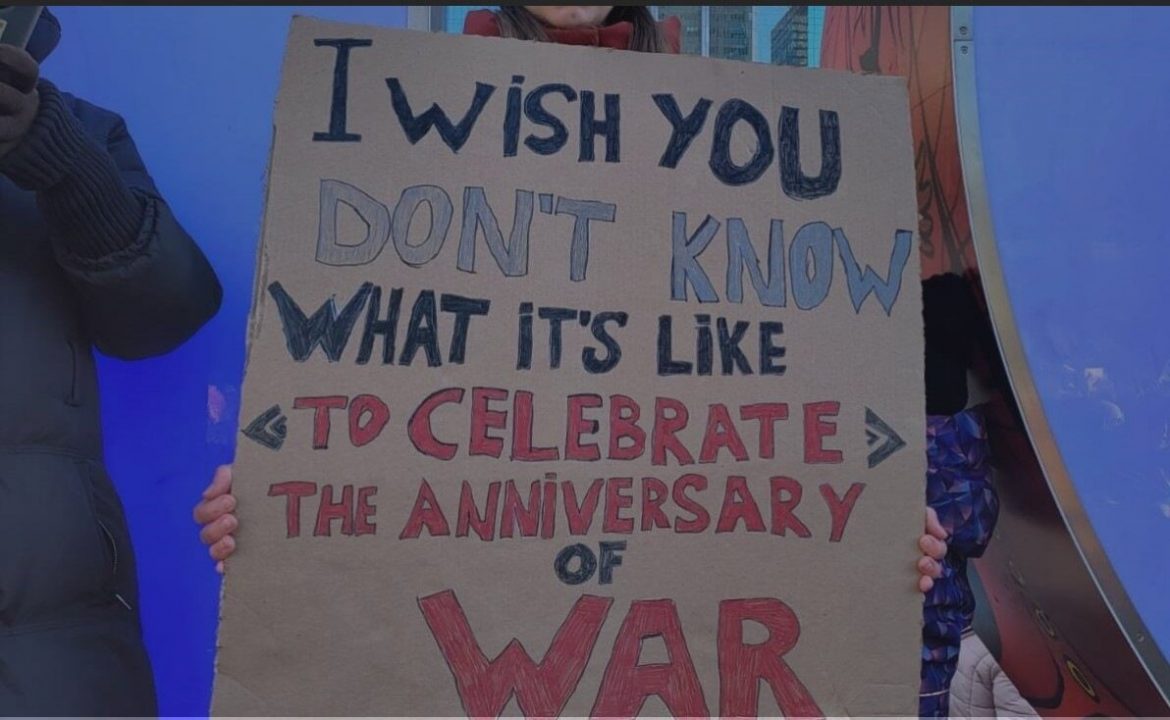Photo Credit: Anna Lysenko
Ukraine’s fatigue, Ukraine’s weapons, Ukraine’s victory
Anna Lysenko, Contributor
Two years after Russia’s full-scale invasion of Ukraine, most Ukrainians still believe Ukraine will win the war. So do I. According to The Hill, 60% of Ukrainians believe they will win by the end of 2025. As an aspiring International Relations specialist, I hesitate to put a timestamp on the victory’s date but I believe it will come.
Like thousands of others, I spent a cold, sunny February Saturday afternoon at the global Russo-Ukrainian War (RUW) rally, honouring the second year of Ukraine’s resilience. Various speeches were given remembering the dead and commending the living. Speakers from both Canada’s liberal and conservative political parties emphasized how the country continues to keep trying to put aside partisan differences for this one cause, this one war for freedom and democracy. These are both things the West has proclaimed it stands for, yet the first cracks of Ukrainian support are starting to show, particularly in the United States, where Republicans are weaponizing non-partisan situations for cheap political victories.
Ukraine knows that it must build itself up to fight its own war, even if its allies start to waver. So it does. Vladimir Putin has made it clear that his Russia is readying for a long-haul “special operation.” Unlike the West, Ukraine has no other option but to keep fighting for its sovereignty. As it fights using more “Made in Ukraine” weapons, I hope that once the time comes to settle the peace, it too will be “Made In, For, and By Ukraine.”
Fatigue. How long does it take for a genocide to become normalized? How long until people get bored of it? Turns out, longer than one may initially expect. It has been two years and although Ukraine may appear less in news headlines, it is still an important agenda item for many. Ukraine outlasted predictions that stated it would be forgotten after a year of fighting.
However, Ukraine is worried that as the war drags on, Western governments and their people will start forgetting why they are providing weapons and money to Ukraine, seemingly for free, and start demanding to stop the supplies. Even worse, there could be increasing pressure on Ukraine to offer Putin concessions in exchange for peace.
Make no mistake: Ukrainians are tired of the war too. Absolutely beyond sick and tired of a war they never wanted. A war that ripped into their country’s borders in 2014. Ripped and kept ripping in the east. The full-scale invasion was an escalation of a war that has haunted Ukraine for 10 years now.
Since Russia’s full-scale invasion, 31,000 Ukrainian soldiers have died defending their country. Can you imagine 31,000 people? I cannot. Every single person out of the 31,000 lost is a network of grief, people mourning their sons and daughters. Good people who will never return home except in the knowledge of their families — the knowledge that they died at Home, defending their Homeland.
Soviet dictator Joseph Stalin once said, “One death is a tragedy, a million is a statistic.” The death toll has not reached so much and I, a devout atheist, pray it never will. However, it breaks my heart to see the quote’s ethos come alive as the RUW keeps bleeding. Ukrainian soldiers die every day, sometimes a few, sometimes a hundred. Missiles still fly at civilians. Yet the conversations around Ukraine have grown quiet. I am not surprised, yet it still chills my heart. War is fought on battlefields and in minds. It is when minds are lost that battles are too. If the West is starting to feel some “fatigue” from Ukraine’s fight for freedom, I suggest talking to someone from Mariupol or Kharkiv or Bucha or Kherson or Avdiivka. I am sure you will feel less tired after that.
Self-Reliance. Even while trying to convince their friends to continue caring, Ukraine is returning to a more pragmatic liberal model — if you start to doubt your allies, you must relearn to rely on yourself. Although Ukraine has continued collaborating with American and European supporters, it has increasingly looked for avenues to produce the weapons it needs domestically. More allied aid is sure to come as 2024 progresses. However, as America’s congressional debates over funding are already demonstrating, the aid is unlikely to come as quickly as Ukraine needs it.
America’s presidential elections also make it an unreliable ally for the foreseeable future — within the next few months, the focus will turn to presidential campaigns, then the elections themselves. Ukraine will likely stay on the agenda, yet attention will once again turn to the news of the moment — who the leading candidate is and why. In less than a year, America’s commander-in-chief could once again be an unfriendly isolationist. This spells out bad news for the liberal world at large. Yet it could mean a particularly dark four-year stretch for Ukraine. Let us remember that the previous US president attempted to hold back aid from current Ukrainian President Zelensky in exchange for some targeted political investigations against his opponents. Were that same president to return to power, he is unlikely to forget this incident either.
Noting this, along with the aforementioned “fatigue,” Ukraine has turned to more self-reliant weapons production schemes. Chief among these developments have been Ukraine’s plans to produce drones, which have become one of the war’s staple weapons. On February 25, Ukraine’s top officials met to discuss the country’s future at the “Ukraine. Year 2024” forum. Amongst them was Mykhailo Federov, Ukraine’s Minister for Digital Transformation. He announced that Ukraine is on track to produce a million drones by the end of the year.
Similar initiatives have sprung up — slow Western aid deliveries have once again made Ukrainian innovation a necessity for frontline survival. I still argue and believe that it is in the West’s best interests to arm Ukraine as strongly and quickly as possible; it is better to arm Ukraine than to let Russia set a precedent for successful conquest. However, I think Ukraine should also look for more ways the West can support institutionalizing and stabilizing Ukrainian weapons-production initiatives. Ukraine cannot defeat Russia alone — its allied partnerships remain a necessity. Yet it is only increased self-reliance that will improve Ukraine’s chances of remaining resilient as many days, weeks, months, or years as it takes to see the end worth fighting for.
Victory. As I write this article, Ukraine still stands. It will never be Russian again. My country has lost too many soldiers, too many civilians, too many children ever to return to being Russian. Putin expected his “special military operation” to be short, maybe even easy. He faced very little resistance in Georgia. He met some resistance in Crimea. He met more resistance in Donbas. In his attempt to conquer all of Ukraine, he faced resistance like he had never seen before.
The “operation” was meant to last a few days, maybe months. It has been 730 days of not losing. Look at the maps above. However you define “Ukrainian victory,” you must admit that Ukraine has not lost. Indeed, that is already a victory. Not the whole victory, not complete liberation, yet still an important testament to Ukraine’s resilience. Cold comfort this is to any Ukrainians who have lost a loved one or a friend — to know that Ukraine has fought its imperial enemy for so much longer than expected.
Ukraine does not expect an easy 2024. When the invasion began, many, I included, still had hopes that this would all end fast, somehow. These hopes have been disproven. There has been no Russian revolution and Putin still sits on his throne. Yet Ukrainians remain resilient because they know there is only one people they can count on to liberate them: themselves. It is this knowledge that has kept the country going for the last two years. This is why the West must accept that any “victory,” however the government and its people choose to define it, must be defined by Ukraine. No one else. Ukrainians do not, cannot, forget that the war they are fighting is existential.
As the now-famous saying goes, if Russia stops fighting, there will be no war; if Ukraine stops fighting, there will be no Ukraine. The hands that have been carrying shields for the last two years are heavy and covered in blood. It is these hands that will craft the peace agreements after victory — that is why Ukraine’s win on Ukraine’s land must be on Ukraine’s terms.




